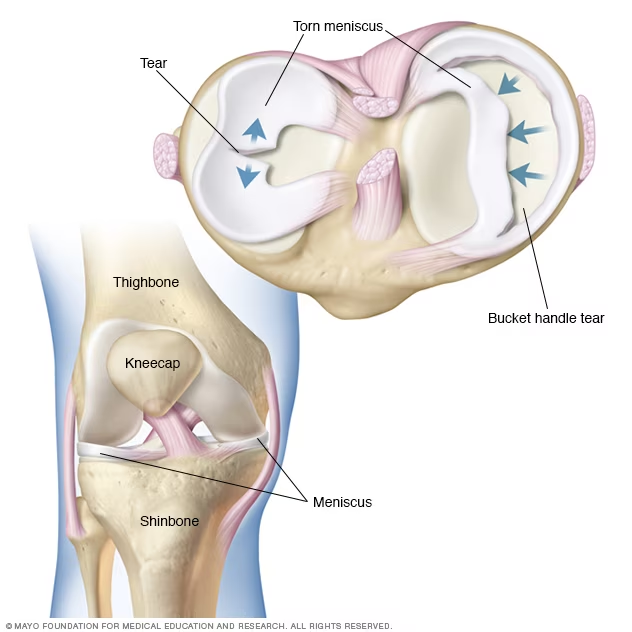Mitigate Pain Clinic – Dr Jeshnu Tople – Pain Management Specialist In Nagpur
Meet Our Doctor

INTERVENTIONAL PAIN AND SPINE SPECIALIST
Dr. Jeshnu Tople
MBBS, DA, DNB, FIAPM, FIPM, FIPP (USA), EDPM (Belgium)
- MBBS from Wardha, Maharashtra
- Diploma in Anaesthesiology from Wardha, Maharashtra
- DNB (Anaesthesiology) from New Delhi
- Fellowship in Pain Management (affiliated to Aesculap Academy, Germany)
- Fellowship of Indian Academy of Pain Medicine from Daradia Pain Hospital, Kolkata
Our Testimonials

Kaustubh Choudhari

Vijay Patil

Ishan Gadekar

Srujan Topale

Deepjit Bhuyan

Meniscus Pain/Injury/Treatment In Nagpur
Meniscus Pain, Injury, and Treatment in Nagpur:
Meniscus injuries are among the most common knee issues, especially for athletes and individuals leading an active lifestyle. If you’re experiencing meniscus pain in Nagpur, it’s important to consult a skilled orthopedic specialist who can provide an accurate diagnosis and effective treatment. Nagpur is home to advanced medical facilities and experienced professionals dedicated to treating meniscus injuries and restoring knee health for long-lasting relief.
Understanding Meniscus Pain and Injuries
The meniscus is a C-shaped cartilage located between the thighbone and shinbone, acting as a shock absorber and providing stability to the knee joint. Meniscus injuries can occur due to sudden twists, heavy lifting, or repetitive strain, especially in active individuals and sports players. Meniscus pain often arises from:
- Meniscus Tears: These injuries are typically caused by sudden knee twists or impacts and can result in pain, swelling, and limited mobility.
- Degenerative Meniscus Injury: Over time, the meniscus can wear down due to aging or overuse, leading to chronic pain and reduced knee function.
- Meniscal Inflammation: Inflammation within the meniscus can cause knee discomfort, affecting everyday activities and making movements painful.
Common Symptoms of Meniscus Pain
Meniscus injuries can vary in severity, but common symptoms include:
- Sharp or aching pain in the knee
- Swelling and tenderness around the joint
- Limited range of motion or stiffness
- Clicking or popping sensation when bending or straightening the knee
- Instability or difficulty bearing weight on the affected knee
If you experience any of these symptoms, it’s essential to seek medical advice in Nagpur to prevent further damage and start appropriate treatment.
Treatment Options for Meniscus Pain in Nagpur
Nagpur offers various effective treatment options for meniscus injuries, from conservative therapies to advanced surgical interventions based on the type and severity of the injury.
1. RICE Protocol (Rest, Ice, Compression, Elevation)
- The RICE method is commonly used as a first-aid measure for minor meniscus injuries, helping reduce pain and swelling to start the healing process.
2. Physical Therapy and Rehabilitation
- Physical therapy is essential for regaining knee strength and mobility after a meniscus injury. A skilled therapist in Nagpur can design a rehabilitation plan to help you safely and effectively recover.
3. Knee Bracing and Support
- Using a knee brace can stabilize the joint, reduce strain on the meniscus, and protect the knee during daily movements and recovery.
4. Pain Management Medications
- Non-steroidal anti-inflammatory drugs (NSAIDs), like ibuprofen, can provide relief from pain and inflammation, allowing you to engage in light physical therapy.
5. Corticosteroid Injections
- In some cases, corticosteroid injections are recommended to reduce inflammation and alleviate pain, providing short-term relief as the meniscus heals.
6. Platelet-Rich Plasma (PRP) Therapy
- PRP therapy is an advanced, minimally invasive treatment option that uses your body’s own platelets to accelerate healing in the meniscus, promoting recovery and reducing pain.
7. Minimally Invasive Surgery (Arthroscopy)
- Severe meniscus tears or injuries that do not respond to other treatments may require arthroscopic surgery, a minimally invasive procedure to repair or remove damaged tissue. Skilled orthopedic surgeons in Nagpur perform these surgeries with precision, ensuring a faster recovery and minimal scarring.
Tips for Preventing Meniscus Injuries
To reduce the risk of meniscus injuries, consider the following preventive measures:
- Warm-Up Before Physical Activity: Warming up and stretching before exercise or sports can prepare the knee for movement and reduce the chance of strains.
- Strengthen Supporting Muscles: Exercises targeting the muscles around the knee, especially the quadriceps and hamstrings, can improve knee stability.
- Wear Proper Footwear: Supportive shoes help maintain knee alignment and reduce pressure on the joint.
- Avoid Sudden Twisting Movements: High-impact sports or activities with sudden knee movements increase the risk of meniscus injury, so be mindful during such exercises. Visit Our Hospital.
When to See a Doctor for Meniscus Pain in Nagpur
If you experience persistent knee pain, difficulty walking, or swelling after a suspected meniscus injury, it’s essential to seek medical care. Early diagnosis and treatment from a qualified orthopedic specialist in Nagpur can prevent the injury from worsening and support a full recovery.
Conclusion
Meniscus injuries can be painful and disrupt daily activities, but with the right care in Nagpur, you can recover effectively and return to an active, pain-free lifestyle. From conservative therapies to advanced treatments, Nagpur offers comprehensive care options to manage and treat meniscus pain. Reach out to an orthopedic expert in Nagpur to start your journey to knee health and stability.

FAQ's For Meniscus Pain/Injury/Treatment In Nagpur
The meniscus is a C-shaped cartilage in the knee joint that acts as a cushion between the thigh bone (femur) and shin bone (tibia), helping stabilize and absorb shock in the knee.
Meniscus injuries commonly result from activities involving twisting, turning, or sudden stops, especially in sports. They can also occur due to degeneration as part of the aging process.
Common symptoms include knee pain, swelling, stiffness, difficulty bending or straightening the knee, a popping sensation, and instability in the knee.
A doctor may perform a physical exam, discuss your symptoms and activity history, and use imaging tests like MRI or X-ray to confirm a meniscus injury.
Small tears in certain parts of the meniscus can heal with rest and conservative treatment, but larger tears, especially in areas with limited blood supply, may require surgery.
Non-surgical treatments include the RICE protocol (Rest, Ice, Compression, Elevation), physical therapy, knee bracing, anti-inflammatory medications, and sometimes corticosteroid injections.
Surgery may be necessary if the tear is large, causes significant pain or instability, or does not improve with non-surgical treatments. Surgery is often recommended for active individuals and athletes.
The main surgical options include meniscus repair (stitching the tear), partial meniscectomy (removing the damaged part), and total meniscectomy (removing the entire meniscus, though this is rare).
Arthroscopy is a minimally invasive surgical procedure that uses a small camera and specialized instruments to repair or remove the damaged meniscus tissue through tiny incisions.
Recovery time varies but typically takes 4 to 6 weeks for minor surgeries, while meniscus repairs may require several months of rehabilitation for full recovery.
Our Treatments
- Joint Pain
- Back Pain
- Sciatica Pain
- Neck Pain
- Hand Pain
- Shoulder Pain
- Foot & Ankle Pain
- Limb Pain
- CRPS Pain
- Cancer Pain
- Headache
- Hyperhidrosis
- Herpes Zoster Pain
- Chronic Pelvic Pain
- Scar Tenderness
- Postherpetic Neuralgia
- Trigeminal Neuralgia
- Peripheral Neuralgia
- Chronic Vascular Pain
- Generalised Body Pain
- Chronic Injury Pain
- Failed Back Surgery Syndrome
- Chronic Post Surgical Pain
- Other Painful Conditions
- Slipped DISC / PIVD